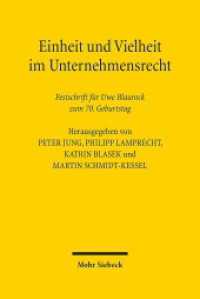- ホーム
- > 洋書
- > 英文書
- > Religion / Ethics
Full Description
The idea that the self is inextricably intertwined with the rest of the world—the "oneness hypothesis"—can be found in many of the world's philosophical and religious traditions. Oneness provides ways to imagine and achieve a more expansive conception of the self as fundamentally connected with other people, creatures, and things. Such views present profound challenges to Western hyperindividualism and its excessive concern with self-interest and tendency toward self-centered behavior.
This anthology presents a wide-ranging, interdisciplinary exploration of the nature and implications of the oneness hypothesis. While fundamentally inspired by East and South Asian traditions, in which such a view is often critical to their philosophical approach, this collection also draws upon religious studies, psychology, and Western philosophy, as well as sociology, evolutionary theory, and cognitive neuroscience. Contributors trace the oneness hypothesis through the works of East Asian and Western schools, including Confucianism, Mohism, Daoism, Buddhism, and Platonism and such thinkers as Zhuangzi, Kant, James, and Dewey. They intervene in debates over ethics, cultural difference, identity, group solidarity, and the positive and negative implications of metaphors of organic unity. Challenging dominant views that presume that the proper scope of the mind stops at the boundaries of skin and skull, The Oneness Hypothesis shows that a more relational conception of the self is not only consistent with contemporary science but has the potential to lead to greater happiness and well-being for both individuals and the larger wholes of which they are parts.
Contents
Contents
Conventions
Acknowledgments
Introduction
Philip J. Ivanhoe, Owen Flanagan, Victoria Harrison, Eric Schwitzgebel, Hagop Sarkissian
1. Oneness: A Big History Perspective
Victoria S. Harrison
2. Oneness and Its Discontent: Contesting Ren in Classical Chinese Philosophy
Tao Jiang
3. One Alone and Many
Stephen R. L. Clark
4. Oneness, Aspects, and the Neo-Confucians
Donald L. M. Baxter
5. One-to-One Fellow Feeling, Universal Identification and Oneness, and Group Solidarities
Lawrence Blum
6. The Relationality and the Normativity of An Ethic of Care
Eva Feder Kittay
7. Oneness and Narrativity: A Comparative Case Study
Mark Unno
8. Kant, Buddhism, and Self-Centered Vice
Bradford Cokelet
9. Fractured Wholes: Corporate Agents and Their Members
Kendy M. Hess
10. Religious Faith, Self-Unification, and Human Flourishing in James and Dewey
Michael R. Slater
11. The Self and the Ideal Human Being in Eastern and Western Philosophical Traditions: Two Types of "Being a Valuable Person"
Cho Geung Ho
12. Hallucinating Oneness: Is Oneness True or Just a Positive Metaphysical Illusion?
Owen Flanagan
13. Episodic Memory and Oneness
Jay Garfield, Shaun Nichols, and Nina Strohminger
14. Confucius and the Superorganism
Hagop Sarkissian
15. Death, Self, and Oneness in the Incomprehensible Zhuangzi
Eric Schwitzgebel
16. Identity Fusion: The Union of Personal and Social Selves
Sanaz Talaifar and William B. Swann, Jr.
17. Tribalism and Universalism: Reflections and Scientific Evidence
Dimitri Putilin
18. Two Notions of Empathy and Oneness
Justin Tiwald
Index







